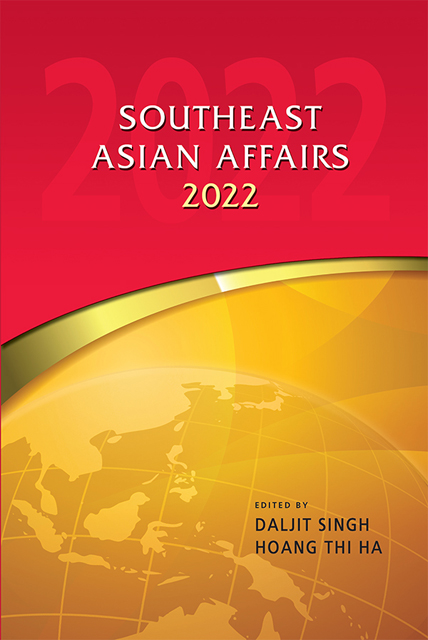Malaysia in 2021: Another Regime Change and the Search for Malay Political Stability
Published online by Cambridge University Press: 01 September 2023
Summary
The year 2021 marked another tumultuous one for Malaysia. There was a third regime change in less than four years, combined with state elections in Melaka (Malacca) and Sarawak, while Malaysian society and the economy continued to struggle under the COVID-19 pandemic. By year’s end there was continued political instability caused by divisions in the Malay political class. The political tussle between the United Malays National Organisation (UMNO) and Parti Pribumi Bersatu Malaysia (Bersatu) meant that, while the government was on paper a Malay-centric administration pursuing a Malay-First policy, there were deep-seated tensions as to which Malay party was the dominant one.
Fall of Muhyiddin and Rise of Ismail Sabri
On 15 August, the Perikatan Nasional (PN) government under Bersatu’s Muhyiddin Yassin fell when UMNO pulled its support from the coalition. The PN had survived for a mere seventeen months. The origins of its fall lay in the way the PN came to power. In the 2018 elections, Bersatu was part of the Pakatan Harapan (PH) coalition, which successfully removed the UMNO-led Barisan Nasional (BN) from power. In February 2020, however, in what was dubbed the Sheraton Move, Muhyiddin led a Bersatu breakaway from the then-ruling PH government. Muhyiddin’s Bersatu faction then formed the Malay-centric PN government with UMNO and Parti Islam Se-Malaysia (PAS). The major incentives for UMNO to prop up the PN was that Zahid Hamidi, UMNO’s current party president, and Najib Razak, Malaysia’s former premier and Zahid’s predecessor, were both on trial for corruption, money laundering and other charges. In addition, half a dozen other UMNO leaders had also been charged during the PH administration. This group, commonly known as the “court cluster”, were probably of the opinion that should UMNO become part of the new government many of these criminal charges would be set aside or dropped. Under Malaysian law the attorney general can offer discharge not amounting to an acquittal (DNAA). In December 2020, a member of the “court cluster”, former minister Tengku Adnam, was given a DNAA in his corruption trial. Muhyiddin had claimed in August 2021, during the twilight days of his premiership, that he had refused to bow to pressure from certain politicians to intervene in their ongoing court cases.
- Type
- Chapter
- Information
- Southeast Asian Affairs 2022 , pp. 195 - 210Publisher: ISEAS–Yusof Ishak InstituteFirst published in: 2023

